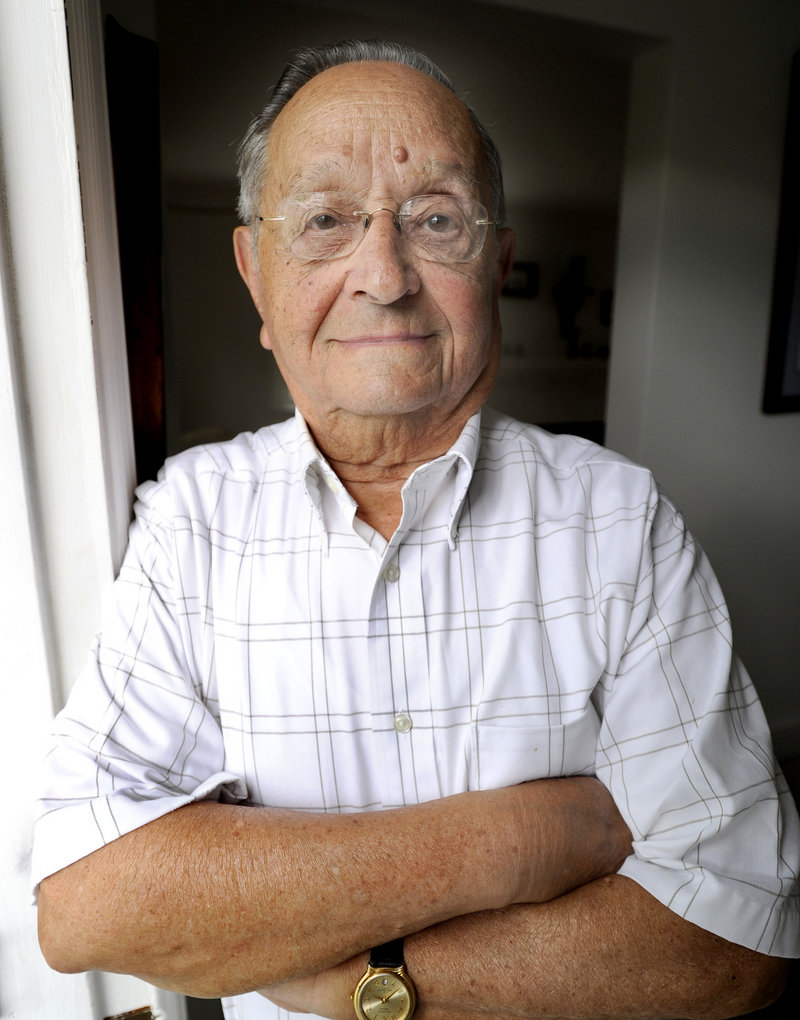PORTLAND – At 90 years old, Jerry Rosen has a wealth of experience.
He’s a Portland native who practiced medicine in the community for 45 years after serving as an Army medic during World War II.
But it’s his skill as a listener that is most in demand these days.
“When you are with somebody who has had a sudden traumatic event, they are anxious to talk to somebody,” Rosen said. “Just to know there is somebody there with them to help them through their ordeal seems to take a load off.”
Rosen is one of about two dozen volunteers with the Greater Portland chapter of the Trauma Intervention Program, which provides emotional support to victims of a traumatic event.
He also happens to be the oldest TIP volunteer in the nation.
The program provides volunteers to help people cope with sudden traumatic events such as the death of a loved one, a fire or a sudden life-threatening medical condition affecting someone close to them.
Police, fire and hospital workers can call the TIP line, which in turn pages the volunteer.
The volunteer arrives within 20 minutes to help console victims and thereby give emergency workers time to complete their tasks.
“It’s a huge benefit to us,” said Portland Assistant Police Chief Michael Sauschuck. Police are often torn between attending to victims and conducting an investigation. The TIP volunteers “can walk into a really emotionally charged atmosphere and come in with some basic information about the processes that are going to take place.”
Rosen recalls one call in which a woman’s 85-year-old husband had a major heart attack. There was no other family.
“I found the woman in the cardiac wing of the intensive care unit,” he said. “She was all alone and in a state of confusion.”
He served as an intermediary with hospital personnel so she was kept up to date. He stayed three hours until a close friend of hers arrived.
Like other volunteers, Rosen agrees to wear a pager for three 12-hour shifts a month, and to respond when called upon by emergency workers or hospital personnel.
His equipment bag includes crayons, coloring books and teddy bears to help occupy children while he meets with the adults.
Sometimes, the best service he can provide is walking the family dog or feeding the cat.
Leslie Skillin-Calder, who works at Community Counseling Center and manages the Trauma Intervention Program, said Rosen is highly regarded among volunteers.
“He just brings a life wisdom to the meetings and a perspective that really helps volunteers look at the big picture at times,” she said.
Skillin-Calder said she would like to see the program grow by another 20 volunteers so it could expand to other communities outside those adjacent to Portland. A new training program begins Sept. 23.
The group also is working to raise its profile so emergency workers know they can be called to help in a variety of situations.
“There are many, many situations where people are under stress. Volunteers could help someone who had a purse stolen, helping them cancel credit cards,” she said. “It’s not necessarily an event that makes the news, but certainly for that person it is a trying time.”
Volunteers undergo an initial training of 50 hours, Rosen said. Then each month, they have three hours of continuing education.
TIP volunteers also put victims in touch with specialized resources that can help them after a tragic event, he said.
Rosen figures he goes on about 20 calls a year.
He sees his age and his seasoned perspective as pluses.
“I think my age and my past experience have given me an advantage,” he said. “I’ve experienced so much in life, most of it good.”
Staff Writer David Hench can be contacted at 791-6327 or at:
dhench@pressherald.com
Send questions/comments to the editors.


